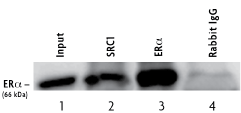Universal Magnetic Co-IP Kit
Universal-Magnetic-Co-IP-Kit-AM471
Synonyms
| Name | Format | Cat No. | Price | Delivery |
|---|
Overview
The Universal Magnetic Co-IP Kit improves co-immunoprecipitation (Co-IP) through the use of protein G-coated magnetic beads, which speed and simplify the procedure while greatly reducing background. The kit includes optimized reagents for making both nuclear & whole-cell extracts from cells or tissue, giving you the flexibility to Co-IP any protein complex, whether it was originally bound to DNA or in the cytoplasm.
Description
Universal Magnetic Co-IP Kit advantages
- Perform Co-IP of nuclear or cytoplasmic protein complexes, beginning from cells or tissue
- Magnetic beads speed and simplify the procedure while reducing background, enabling the use of low-stringency buffers that maintain complex integrity
- Nuclear extraction procedure removes nuclear protein complexes from the DNA without disrupting protein/protein interactions
- Inhibitor solutions included to preserve the integrity of protein modifications
Perform Co-IP of cytoplasmic & nuclear protein complexes
While Co-IP is often used to study cytoplasmic protein complexes, traditional methods are not optimal for studying DNA-binding proteins because these nuclear complexes are fragile and can be difficult to remove from the DNA. This causes them to either be disrupted during extraction, or to be lost because they remain bound to the DNA. For this reason, in addition to containing components for whole-cell extraction, the Universal Magnetic Co-IP Kit provides nuclear extraction reagents that have been optimized to preserve nuclear protein complexes. The reduced background provided by the low non-specific binding of the kit's magnetic beads makes it possible to use a low-stringency Co-IP/Wash Buffer that helps maintain the protein complexes (Figure 1). To further improve Co-IP of nuclear complexes, the kit’s proprietary Enzymatic Shearing Cocktail uses DNA digestion to release undissociated protein complexes from the DNA. Even histone complexes, which are not released from the DNA by traditional high-salt extraction methods, can be studied (Figure 2).

Figure 1: Co-Immunoprecipitation of a nuclear complex containing SRC-1 and ERα.
The Universal Magnetic Co-IP Kit was used to make nuclear extract from MCF-7 cells that had been induced 1 hour with 10 nM Estradiol. IP was performed on 300 µg samples using 2 µg of SRC-1 pAb, ERα pAb and rabbit IgG (as a negative control). Western blot was then performed using the ERα pAb on 10 µg Input Extract, SRC-1 IP, ERα IP and the rabbit IgG IP.

Figure 2: Detection of acetylated Histone H3.
HeLa nuclear extracts were made using the Universal Magnetic Co-IP Kit and a traditional high-salt extraction protocol, supplemented with 1 µM trichostatin A, a deacetylase inhibitor. Five and ten µg samples of each extract were used in Western with Histone H3 acetyl pAb. Protein was detected only in samples made using the kit’s nuclear extraction procedure, as it was designed to release histone and other protein complexes from DNA while preserving modifications.
Contents
Contents & Storage
Each Universal Magnetic Co-IP Kit provides sufficient reagents to make 25 nuclear and 25 whole-cell extractions, and then to perform 25 co-immunoprecipitations. Kits include PBS, Hypotonic Buffer, Whole-cell Lysis Buffer, Co-IP/Wash Buffer, Phosphatase Inhibitors, Protease Inhibitor Cocktail, Deacetylase Inhibitor, PMSF, EDTA, Digestion Buffer, Enzymatic Shearing Cocktail, Detergent, Protein G Magnetic Beads and a Bar Magnet for making a magnetic stand. The reagent storage conditions vary from room temperature to -20°C. Please download a manual for complete kit specifications and storage conditions. All reagents are guaranteed stable for 6 months when stored properly.
References
The following publications cite the use of and/or provide additional information about the Universal Magnetic Co-IP Kit:
- “PTEN regulates glioblastoma oncogenesis through chromatin-associated complexes of DAXX and histone H3.3.” by Benitez et al. (2017) Nature Communications 8(15223).
